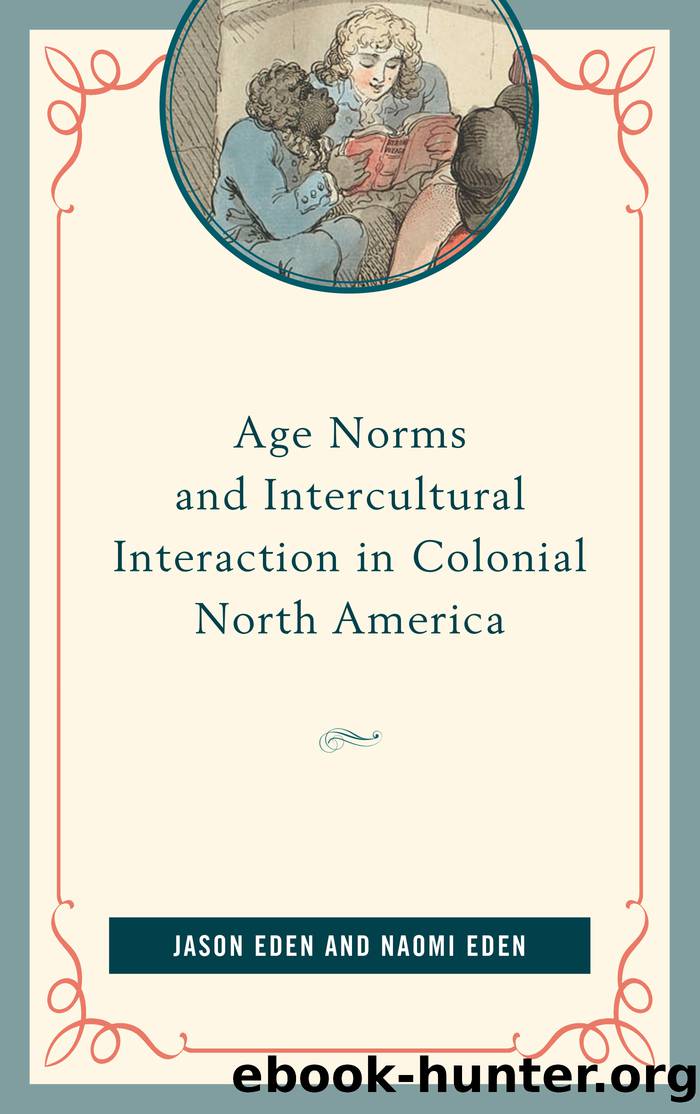Age Norms and Intercultural Interaction in Colonial North America by Eden Jason;Eden Naomi;

Author:Eden, Jason;Eden, Naomi;
Language: eng
Format: epub
Tags: undefined
Publisher: Lexington Books/Fortress Academic
Published: 2012-08-15T00:00:00+00:00
Youth
Information specifically related to youth is difficult to find in records related to the Middle Colonies. Nonetheless, there are fascinating glimpses and clues about persons aged seven to twenty-five years in a few surviving sources. In most cases, colonists in this region shared many basic assumptions regarding youth with Europeans who lived elsewhere in North America. Beliefs that youth were prone to reckless behavior, sexual indiscretion, and corruptibility were predominant. However, there were some differences in terms of how residents of the Middle Colonies acted upon these assumptions during their interactions with youth.
In the Middle Colonies, as elsewhere, youth occupied a nebulous legal status. They possessed few of the rights of adults yet bore many similar responsibilities under the law. This is similar, in some respects, to the current legal situation of youth in the United States, yet a key difference in early North America was that youth made up a much larger proportion of the overall population. That is, age-based disenfranchisement affected a significant percentage of persons during colonial times. In terms of basic demography, in 1700, over half of the American colonists were under the age of sixteen. Currently, only about 12 percent of the American population today is under sixteen. At the time, the median age of the population was sixteen, today it is closer to thirty-five. It is important to remember that even though the youth were the majority in terms of demographics, their power as a group was limited and their elders retained power and decision making within most government institutions. Another key difference, of course, was that women of any age lacked legal rights in the colonies, whereas adult women in contemporary North America gain such rights when they reach the requisite ages.[53]
Again and again, important government documents reveal that persons, specifically young men, under the age of twenty-one lacked access to status, position, and power in the Middle Colonies. Labor contracts in New Amsterdam stipulated that younger men would receive much lower wages than older men. Young men might receive forty guilders a year, but older males earned three times that amount. In 1682, the frame of the government of Pennsylvania was outlined by William Penn. According to the document, the governor could not hold office if he was younger than twenty-one. If the father of the governor failed to specify in writing who would serve as guardians or commissioners in case of an underage heir, the Provincial Council would appoint three guardians, one of whom would serve as governor until the son came of age. This policy was reaffirmed in 1683, once the colonists actually arrived in the colony. Similarly, in 1727, the provincial council of Pennsylvania passed a measure determining that only those twenty-one and older could vote for members of the Assembly. As Holly Brewer has noted, colonial officials throughout North America, like those in Old England, specifically disenfranchised potential citizens due to their age long before they passed similar measures in regard to racial groups. The evidence indicates that this was as true in the Middle Colonies as it was elsewhere.
Download
This site does not store any files on its server. We only index and link to content provided by other sites. Please contact the content providers to delete copyright contents if any and email us, we'll remove relevant links or contents immediately.
Women and Jewish Marriage Negotiations in Early Modern Italy by Howard Tzvi Adelman(380)
Warrior King by Wilbur Smith(324)
18 real-life stories of serial killers and murderers with solved and unsolved killings from the USA, UK, Europe, and beyond. by Ben Oakley(265)
Who's Who in the Zulu War, 1879: The British by Adrian Greaves Ian Knight(254)
Violence and Emotions in Early Modern Europe by Susan Broomhall;Sarah Finn;(241)
The Battle of Austerlitz by 50minutes(228)
The American Crisis by Unknown(224)
The Seeker by S. G. MacLean(204)
The Origins of French Absolutism, 1598-1661 by Alan James(200)
The Dutch East India Company and British East India Company: The History and Legacy of the Worldâs Most Famous Colonial Trade Companies by Charles River Editors(199)
Invisible Worlds by Peter Marshall(183)
The Traitor of Colditz by Robert Verkaik(182)
A Genius for Confusion by Richard M. Fried(182)
The Slave Trade in Africa by Simon Webb;(179)
Youth, Heroism and War Propaganda: Britain and the Young Maritime Hero, 1745â1820 by D. A. B. Ronald(177)
Fires of Faith by Catholic England under Mary Tudor(177)
The Thirty Years War â Complete by Friedrich Schiller(176)
The Opium Wars: Exploring the Addiction of Empires from Beginning to End by Ramos Adrian & Compacted History(175)
Interest and Connection in the Eighteenth Century by Jacob Sider Jost(175)
